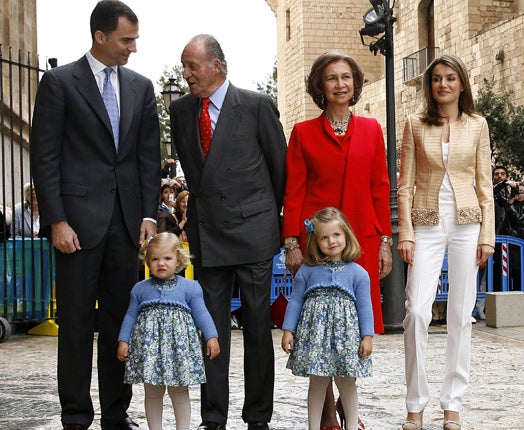Spanish King rebrands for the recession
Juan Carlos to be 'more open' in effort to boost image and heal political rift

Your support helps us to tell the story
From reproductive rights to climate change to Big Tech, The Independent is on the ground when the story is developing. Whether it's investigating the financials of Elon Musk's pro-Trump PAC or producing our latest documentary, 'The A Word', which shines a light on the American women fighting for reproductive rights, we know how important it is to parse out the facts from the messaging.
At such a critical moment in US history, we need reporters on the ground. Your donation allows us to keep sending journalists to speak to both sides of the story.
The Independent is trusted by Americans across the entire political spectrum. And unlike many other quality news outlets, we choose not to lock Americans out of our reporting and analysis with paywalls. We believe quality journalism should be available to everyone, paid for by those who can afford it.
Your support makes all the difference.Spain's King Juan Carlos is admired for many things here, such as his historic role in the transition to democracy, or his diplomatic clout in the US and Latin America. But openness to the public? That's not a trait often associated with the Spanish monarchy.
The King's secrecy, in fact, is seen as the key to his past success as a behind-the-scenes mediator between the country's political factions. But a new era is apparently dawning at the Zarzuela, the country estate the King chose as his royal residence instead of Madrid's luxurious royal palace.
His public relations team has announced that, for the first time since Juan Carlos was installed on the throne in 1975, it will publish his agenda of private meetings and selected morsels from his discussions – that is, as long as his conversational partners agree to the public airing.
The Zarzuela hopes that this sudden willingness to blather will boost the King's public image. A similar information blitz for the dashing Crown Prince will follow, according to Ramón Iribarren, chief spokesman for the King's office. And the royal's business will soon hit social networks.
"The philosophy is to make the King's activities, his priorities and concerns, known to the public," Mr Iribarren told The Independent. "I don't think the average citizen knows what the King's work consists of. Only the least transcendental aspects come out, mostly in the tabloids, rather than his role as head of state."
Mr Iribarren is referring to the unflattering recent developments, such as the divorce of the King's eldest daughter, the Infanta Elena, or the King's outburst to Hugo Chávez: "Why don't you just shut up?" Queen Sofia also caused a public-relations headache for the crown when her uncharacteristically candid comments about gay rights and gay marriage appeared in a biography, The Queen Up Close. The family is most often photographed while sailing in Majorca, or attending formal galas. Until now, weightier matters merely leaked to the press.
Mr Iribarren denied the new policy is a reaction to the recent economic crisis. But it is widely seen as a sign that the King is trying to take a greater role in healing the deep political rift between the two major political parties on how to trim Spain's ballooning deficit and ease market jitters.
"In times of crisis, people tend to look to the King for moral guidance and leadership," said Charles Powell, a history professor at San Pablo-CEU University in Madrid and author of the biography, Juan Carlos of Spain: Self-Made Monarch. "And when there's acute polarisation between the political parties, the King's role becomes more important."
The King has never needed a publicity blitz in the past. The vast majority of Spaniards – as much as 75 per cent – rank the Spanish monarchy above any other public institution in the country, according to Juan Díez Nicolás, a sociologist whose research firm, ASEP/JDS, conducts yearly opinion polls on the Spanish monarchy.
King Juan Carlos himself always ranks among the top 10 most popular figures in the country. Few Spaniards forget the fact that he was appointed by a dictator, of course. But he is widely credited with thwarting the 1981 military coup and helping to mediate between the country's fledgling institutions and political factions in the transition to democracy.
Join our commenting forum
Join thought-provoking conversations, follow other Independent readers and see their replies
Comments